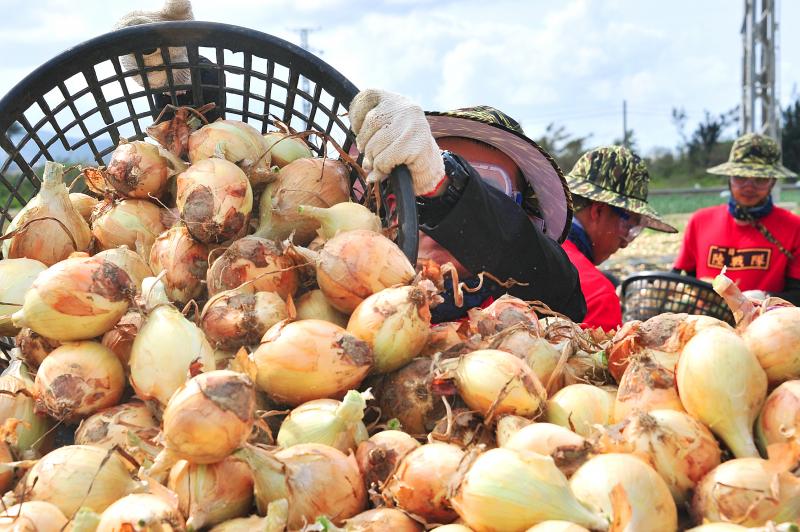Onions, with their sweet aroma, are a popular cooking ingredient, used in both Western and Eastern cuisines. Today, however, information is appearing online suggesting that onions should not be eaten with fish, shrimp, seaweed or honey, as these combinations cause kidney stones. But is there any truth to this? The Taiwan FactCheck Center asked dieticians and experts and confirmed that this information was false. Onion loving foodies everywhere can breathe a sigh of relief.
According to information on certain social media platforms, onions should not be eaten together with fish, as the fish has a high protein content, and the oxalic acid in the onion will break down and destroy the protein in the fish and make it form a precipitate that is not easily absorbed by the human body.
The rumor that onions should not be eaten with shrimp suggests that the calcium oxalate formed by the shrimp produces kidney stones, while the problem with eating onions with seaweed apparently comes from the large amounts of iodine and calcium found in the seaweed, which can easily form stones due to the oxalic acid in the onions. Finally, there are rumors saying that eating onions with honey can be bad for the eyes, and can lead to impaired vision or blindness.

Photo: Tsai Tsung-hsien, Liberty Times照片:自由時報記者蔡宗憲
After consulting dieticians and experts, the FactCheck center was able to disprove these rumors.
According to Lee Pei-ni, director of the Department of Nutrition at Taipei Hospital, if one consumes large amounts of food containing oxalic acid, the body’s ability to absorb protein can be impaired. Onions, however, are not rich in oxalic acid, and people do not normally consume large amounts of onions in their meals (say, eight onions every meal continuously for a whole month), and therefore the situation indicated in the rumors is unlikely to happen.
So, what about the rumor saying that eating onions together with shrimps or seaweed will lead to the formation of calcium oxalate, and thus to the formation of kidney stones? According to Lee, there are many factors contributing to the formation of stones, and a person in a normal state of health will not develop kidney stones from eating specific types of food. The old wives’ tale that one should not eat spinach with tofu, for example, carries little water.
Lee adds that, even though stones have a lot of calcium in them, that doesn’t mean that eating foods containing calcium and oxalic acid will be a major contributing factor to the formation of stones, which is more likely the result of the individual’s constitution or hereditary factors. It is sufficient for normally healthy people to maintain a balanced diet and to make sure they are getting enough food.
On the rumor that onions should not be eaten together with honey, or it could be bad for the eyes and even possibly lead to a loss of eyesight, Lee clarified that onions and honey are both natural foods and that, if eaten as part of a balanced diet, there will be no risk of impaired vision. One thing to bear in mind, however, is that raw onions can be relatively spicy and cause abdominal bloating, and so she recommends that people with relatively sensitive stomachs should eat them sparingly, so that is doesn’t place an overly large burden on the body.
(Translated by Paul Cooper, Taipei Times)
帶著甜味的洋蔥是熱門食材之一,足跡遍佈東西方料理界,但如今,網路上竟有「洋蔥不能和魚、蝦、海帶、蜂蜜一起吃」否則會產生腎結石的訊息,究竟是真是假?台灣事實查核中心求證營養師及專家,證實該消息為錯誤訊息,熱愛洋蔥的饕客大可放心。
社群平台流傳訊息稱,「哪些食物不能和洋蔥一起吃?洋蔥和魚不能一起吃,魚中含有豐富的蛋白質,洋蔥和魚同吃,洋蔥裡的草酸會分解、破壞魚中豐富的蛋白質,使之沉澱,不容易被人體消化吸收。洋蔥和蝦;洋蔥和蝦不能一起吃,蝦形成草酸鈣產生結石。洋蔥和海帶;洋蔥和海帶不能一起吃,海帶裡邊含有豐富的碘和鈣,洋蔥含有草酸,洋蔥和海帶一起吃容易形成結石。洋蔥和蜂蜜;洋蔥和蜂蜜不能一起吃,一起吃對眼睛不好,會引起眼睛的不適,嚴重的還會導致眼睛失明」。經查核中心求證營養領域專家,證實此為錯誤訊息。
針對蛋白質部分,臺北醫院營養科主任李佩霓指出,若攝取大量含草酸食物,食物中的草酸會干擾蛋白質的吸收,但洋蔥為低草酸食物,正常飲食狀況下並不會攝取大量洋蔥(如,一餐吃八顆洋蔥、連吃一個月等),因此不會有傳言所指的狀況。
傳言指出「洋蔥和蝦、海帶一起吃會形成草酸鈣,成為結石」,是否屬實?李佩霓解釋,影響結石形成的因素很多,一般健康狀態的人不會因為吃了特定食物就引起結石,如老謠言「菠菜不能和豆腐同時食用」,此為錯誤觀念。
李佩霓也補充正確觀念指出,結石成分中有許多鈣,但是含鈣與含草酸的食物一起食用,並不是造成結石生成的主因,結石有可能是個人體質或遺傳等原因造成;建議一般人把握均衡飲食、足量飲水的兩大原則即可。
又針對傳言「洋蔥和蜂蜜不能一起吃」否則對眼睛不好、可能釀失明部分,李佩霓澄清,洋蔥和蜂蜜各自都是天然的食物,在均衡飲食的狀況下,不會有失明的風險。唯一要留意的是,洋蔥生食較為辛辣,且容易造成腹部脹氣,建議腸胃較敏感者少量攝取,才不致造成身體過大的負擔。
(自由時報)

In an effort to fight phone scams, British mobile phone company O2 has introduced Daisy, an AI designed to engage phone con artists in time-wasting conversations. Daisy is portrayed as a kindly British granny, exploiting scammers’ tendency to target the elderly. Her voice, based on a real grandmother’s for authenticity, adds to her credibility in the role. “O2” has distributed several dedicated phone numbers online to direct scammers to Daisy instead of actual customers. When Daisy receives a call, she translates the scammers’ spoken words into text and then responds to them accordingly through a text-to-speech system. Remarkably, Daisy

Bilingual Story is a fictionalized account. 雙語故事部分內容純屬虛構。 Emma had reviewed 41 resumes that morning. While the ATS screened out 288 unqualified, she screened for AI slop. She could spot it a mile away. She muttered AI buzzwords like curses under her breath. “Team player.” “Results-driven.” “Stakeholder alignment.” “Leveraging core competencies.” Each resume reeked of AI modeling: a cemetery of cliches, tombstones of personality. AI wasn’t just changing hiring. It was draining the humanity from it. Then she found it: a plain PDF cover letter. No template. No design flourishes. The first line read: “I once tried to automate my

Every May 1, Hawaii comes alive with Lei Day, a festival celebrating the rich culture and spirit of the islands. Initiated in 1927 by the poet Don Blanding, Lei Day began as a tribute to the Hawaiian custom of making and wearing leis. The idea was quickly adopted and officially recognized as a holiday in 1929, and leis have since become a symbol of local pride and cultural preservation. In Hawaiian culture, leis are more than decorative garlands made from flowers, shells or feathers. For Hawaiians, giving a lei is as natural as saying “aloha.” It shows love and

1. 他走出門,左右看一下,就過了馬路。 ˇ He walked outside, looked left and right, and crossed the road. χ He walked outside and looked left and right, crossed the road. 註︰並列連接詞 and 在這句中連接三個述語。一般的結構是 x, y, and z。x and y and z 是加強語氣的結構,x and y, z 則不可以。 2. 他們知道自己的弱點以及如何趕上其他競爭者。 ˇ They saw where their weak points lay and how they could catch up with the other competitors. χ They saw where their weak points lay and how to catch up with the other competitors. 註:and 一般連接同等成分,結構相等的單詞、片語或子句。誤句中 and 的前面是子句,後面是不定詞片語,不能用 and 連接,必須把不定詞片語改為子句,and 前後的結構才相等。 3. 她坐上計程車,直接到機場。 ˇ She took a cab, which took her straight to the airport. ˇ She took a cab and it took her straight